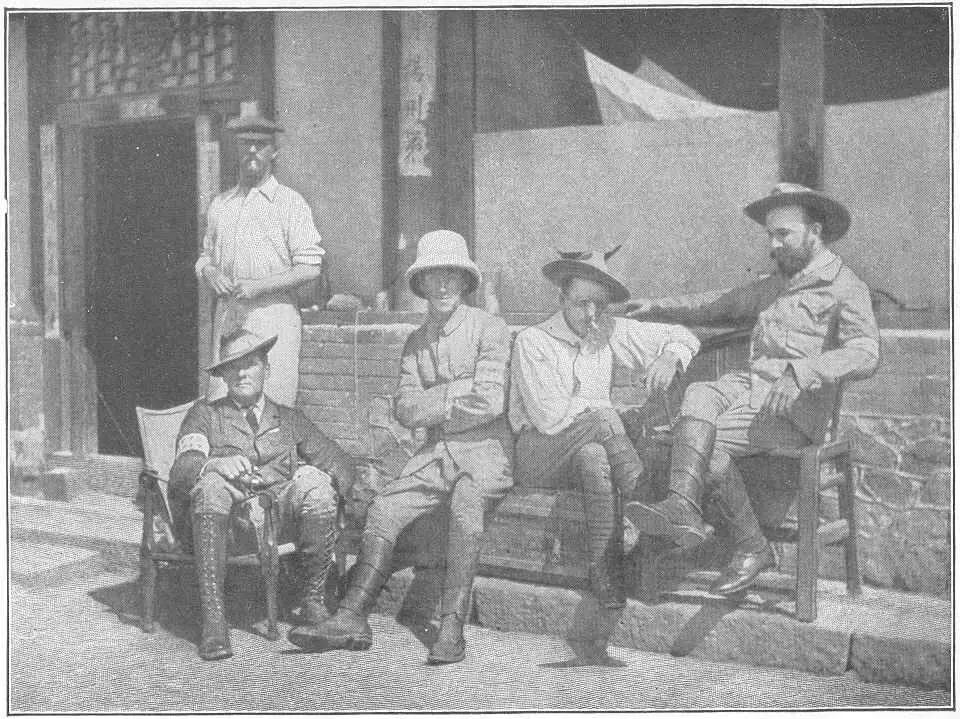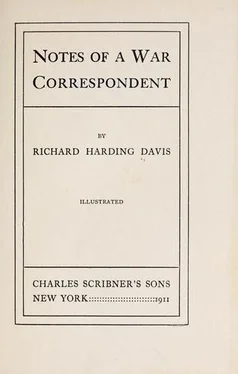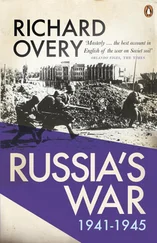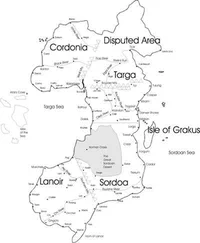Richard Davis - Notes of a War Correspondent
Здесь есть возможность читать онлайн «Richard Davis - Notes of a War Correspondent» весь текст электронной книги совершенно бесплатно (целиком полную версию без сокращений). В некоторых случаях можно слушать аудио, скачать через торрент в формате fb2 и присутствует краткое содержание. Город: New York, Год выпуска: 1911, Издательство: Charles Scribner’s Sons, Жанр: Публицистика, prose_military, на английском языке. Описание произведения, (предисловие) а так же отзывы посетителей доступны на портале библиотеки ЛибКат.
- Название:Notes of a War Correspondent
- Автор:
- Издательство:Charles Scribner’s Sons
- Жанр:
- Год:1911
- Город:New York
- ISBN:нет данных
- Рейтинг книги:5 / 5. Голосов: 1
-
Избранное:Добавить в избранное
- Отзывы:
-
Ваша оценка:
- 100
- 1
- 2
- 3
- 4
- 5
Notes of a War Correspondent: краткое содержание, описание и аннотация
Предлагаем к чтению аннотацию, описание, краткое содержание или предисловие (зависит от того, что написал сам автор книги «Notes of a War Correspondent»). Если вы не нашли необходимую информацию о книге — напишите в комментариях, мы постараемся отыскать её.
Summary by Neeru Iyer
Notes of a War Correspondent — читать онлайн бесплатно полную книгу (весь текст) целиком
Ниже представлен текст книги, разбитый по страницам. Система сохранения места последней прочитанной страницы, позволяет с удобством читать онлайн бесплатно книгу «Notes of a War Correspondent», без необходимости каждый раз заново искать на чём Вы остановились. Поставьте закладку, и сможете в любой момент перейти на страницу, на которой закончили чтение.
Интервал:
Закладка:
Then, like shadows, the foreign attachés, whom we fondly hoped might turn out to be Russian Cossacks coming to take us prisoners and carry us off to breakfast, rode up in silence and were halted at the base of the hill. It seemed now, the audience being assembled, the orchestra might begin. But no hot-throated cannon broke the chilling, dripping, silence, no upheaval of the air spoke of Canet guns, no whirling shrapnel screamed and burst. Instead, the fog rolled back showing us miles of waving corn, the wet rails of the Siberian Railroad glistening in the rain, and, masking the horizon, the same mountains from which the day before the smoke rings had ascended. They now were dark, brooding, their tops hooded in clouds. Somewhere in front of us hidden in the Kiao liang, hidden in the tiny villages, crouching on the banks of streams, concealed in trenches that were themselves concealed, Oku’s army, the army to which we were supposed to belong, was buried from our sight. And in the mountains on our right lay the Fourth Army, and twenty miles still farther to the right, Kuroki was closing in upon Liao-Yang. All of this we guessed, what we were told was very different, what we saw was nothing. In all, four hundred thousand men were not farther from us than four to thirty miles—and we saw nothing. We watched as the commissariat wagons carrying food to these men passed us by, the hospital stores passed us by, the transport carts passed us by, the coolies with reserve mounts, the last wounded soldier, straggler, and camp-follower passed us by. Like a big tidal wave Oku’s army had swept forward leaving its unwelcome guests, the attachés and correspondents, forty lonely foreigners among seventy thousand Japanese, stranded upon a hill miles in the rear. Perhaps, as war, it was necessary, but it was not magnificent.
That night Major Okabe, our head teacher, gave us the official interpretation of what had occurred. The Russians, he said, had retreated from Liao-Yang and were in open flight. Unless General Kuroki, who, he said, was fifty miles north of us, could cut them off they would reach Mukden in ten days, and until then there would be no more fighting. The Japanese troops, he said, were in Liao-Yang, it had been abandoned without a fight. This he told us on the evening of the 27th of August.
The next morning Major Okabe delivered the answer of General Oku to our round-robin. He informed us that we had been as near to the fighting as we ever would be allowed to go. The nearest we had been to any fighting was four miles. Our experience had taught us that when the Japanese promised us we would be allowed to do something we wanted to do, they did not keep their promise; but that when they said we would not be allowed to do something we wanted to do, they spoke the truth. Consequently, when General Oku declared the correspondents would be held four miles in the rear, we believed he would keep his word. And, as we now know, he did, the only men who saw the fighting that later ensued being those who disobeyed his orders and escaped from their keepers. Those who had been ordered by their papers to strictly obey the regulations of the Japanese, and the military attachés, were kept by Oku nearly six miles in the rear.

On the receipt of Oku’s answer to the correspondents, Mr. John Fox, Jr., of Scribner’s Magazine , Mr. Milton Prior, of the London Illustrated News , Mr. George Lynch, of the London Morning Chronicle , and myself left the army. We were very sorry to go. Apart from the fact that we had not been allowed to see anything of the military operations, we were enjoying ourselves immensely. Personally, I never went on a campaign in a more delightful country nor with better companions than the men acting as correspondents with the Second Army. For the sake of such good company, and to see more of Manchuria, I personally wanted to keep on. But I was not being paid to go camping with a set of good fellows. Already the Japanese had wasted six months of my time and six months of Mr. Collier’s money, Mr. Fox had been bottled up for a period of equal length, while Mr. Prior and Mr. Lynch had been prisoners in Tokio for even four months longer. And now that Okabe assured us that Liao-Yang was already taken, and Oku told us if there were any fighting we would not be allowed to witness it, it seemed a good time to quit.
Other correspondents would have quit then, as most of them did ten days later, but that their work and ours in a slight degree differed. As we were not working for daily papers, we used the cable but seldom, while they used it every day. Each evening Okabe brought them the official account of battles and of the movements of the troops, which news of events which they had not witnessed they sent to their separate papers. But for our purposes it was necessary we should see things for ourselves. For, contrary to the popular accusation, no matter how flattering it may be, we could not describe events at which we were not present.
But what mainly moved us to decide, was the statements of Okabe, the officer especially detailed by the War Office to aid and instruct us, to act as our guide, philosopher, and friend, our only official source of information, who told us that Liao-Yang was occupied by the Japanese and that the Russians were in retreat. He even begged me personally to come with him into Liao-Yang on the 29th and see how it was progressing under the control of the Japanese authorities.
Okabe’s news meant that the great battle Kuropatkin had promised at Liao-Yang, and which we had come to see, would never take place.
Why Okabe lied I do not know. Whether Oku had lied to him, or whether it was Baron-General Kodama or Major-General Fukushima who had instructed him to so grossly misinform us, it is impossible to say. While in Tokio no one ever more frequently, nor more unblushingly, made statements that they knew were untrue than did Kodama and Fukushima, but none of their deceptions had ever harmed us so greatly as did the lie they put into the mouth of Okabe. Not only had the Japanese not occupied Liao-Yang on the evening of the 27th of August, but later, as everybody knows, they had to fight six days to get into it. And Kuroki, so far from being fifty miles north toward Mukden as Okabe said he was, was twenty miles to the east on our right preparing for the closing in movement which was just about to begin. Three days after we had left the army, the greatest battle since Sedan was waged for six days.
So our half year of time and money, of dreary waiting, of daily humiliations at the hands of officers with minds diseased by suspicion, all of which would have been made up to us by the sight of this one great spectacle, was to the end absolutely lost to us. Perhaps we made a mistake in judgment. As the cards fell, we certainly did. But after the event it is easy to be wise. For the last fifteen years, had I known as much the night before the Grand Prix was run as I did the next afternoon, I would be passing rich.
The only proposition before us was this: There was small chance of any immediate fighting. If there were fighting we could not see it. Confronted with the same conditions again, I would decide in exactly the same manner. Our misfortune lay in the fact that our experience with other armies had led us to believe that officers and gentlemen speak the truth, that men with titles of nobility, and with the higher titles of general and major-general, do not lie. In that we were mistaken.
The parting from the other correspondents was a brutal attack upon the feelings which, had we known they were to follow us two weeks later to Tokio, would have been spared us. It is worth recording why, after waiting many months to get to the front, they in their turn so soon left it. After each of the big battles before Liao-Yang they handed the despatches they had written for their papers to Major Okabe. Each day he told them these despatches had been censored and forwarded. After three days he brought back all the despatches and calmly informed the correspondents that not one of their cables had been sent. It was the final affront of Japanese duplicity. In recording the greatest battle of modern times three days had been lost, and by a lie. The object of their coming to the Far East had been frustrated. It was fatuous to longer expect from Kodama and his pupils fair play or honest treatment, and in the interest of their employers and to save their own self-respect, the representatives of all the most important papers in the world, the Times , of London, the New York Herald , the Paris Figaro , the London Daily Telegraph, Daily Mail , and Morning Post , quit the Japanese army.
Читать дальшеИнтервал:
Закладка:
Похожие книги на «Notes of a War Correspondent»
Представляем Вашему вниманию похожие книги на «Notes of a War Correspondent» списком для выбора. Мы отобрали схожую по названию и смыслу литературу в надежде предоставить читателям больше вариантов отыскать новые, интересные, ещё непрочитанные произведения.
Обсуждение, отзывы о книге «Notes of a War Correspondent» и просто собственные мнения читателей. Оставьте ваши комментарии, напишите, что Вы думаете о произведении, его смысле или главных героях. Укажите что конкретно понравилось, а что нет, и почему Вы так считаете.












